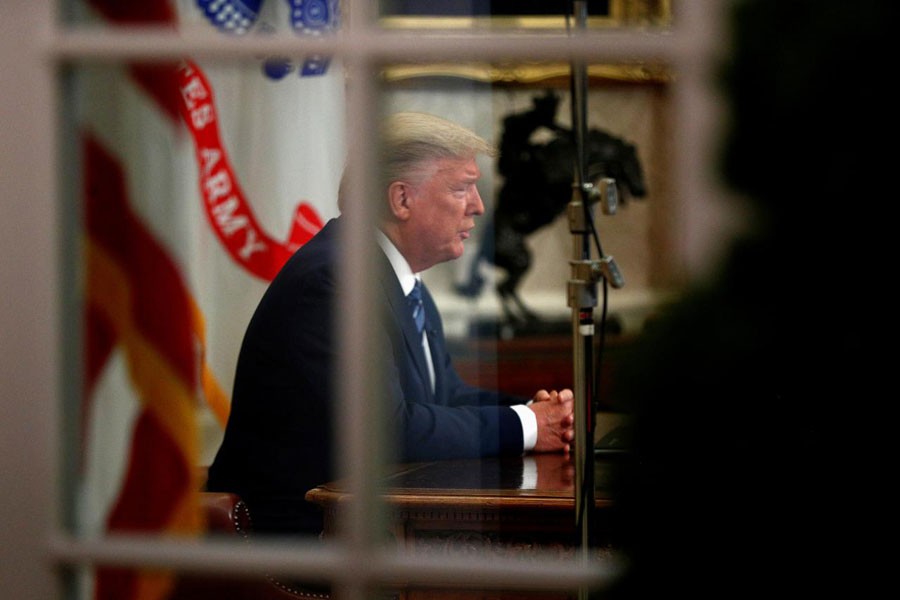On Monday, February 24, with stock markets close to all-time highs, the world was suddenly thrown into a financial crisis as a result of the COVID-19 pandemic. And ever since, international leaders have been making the worst of a bad situation. On March 06, Russia and Saudi Arabia started an oil-price war, which shook global markets further. And US President Donald Trump's televised address on March 11, in which he announced a suspension of most travel from Europe to the United States, brought the crisis to an entirely new height and plunged financial markets into unmitigated panic.
The combination of a coronavirus-induced growth slowdown and worldwide financial panic means that a global recession this year is virtually certain. But recession might soon be the least of our worries.
Financial crashes follow a clear logic in both their evolution and resolution, as Charles Kindleberger taught us in his seminal book Manias, Panics, and Crashes: A History of Financial Crises. Argentina and Lebanon have already defaulted on their foreign debts since the COVID-19 outbreak. Major corporate bankruptcies will likely come next. Travel companies and airlines are natural candidates, but failures often come in surprising areas.
After a few big bankruptcies and sovereign defaults, the world is likely to face a liquidity freeze, as it did in September 2008, following Lehman Brothers' bankruptcy. A liquidity freeze typically hits periphery countries that have their own currencies, which will collapse - prompting a flight to the dollar and the euro.
Although it is very difficult to restore confidence once financial panic has erupted, the resolution of the 2008 crisis offers important lessons for policymakers today. True, that crisis originated in the financial sector, which now appears to be much better capitalised, and policymakers back then had no pandemic to contend with. Nonetheless, the fundamental lessons remain the same.
Stemming a global financial panic requires two things: international political cooperation and vast amounts of government liquidity (because the private sector will hoard cash). Although the resolution of the 2008 crisis looked like a mess at the time, in hindsight it appears almost ideal.
Back in 2008, US political leaders had the stature to help rally the world. In mid-November that year, President George W. Bush convened the G20 Washington Summit on Financial Markets and the World Economy, which marked the start of a coordinated global effort to resolve the crisis. Crucially, the unanimously adopted summit declaration stated that, "We are determined to enhance our cooperation and work together to restore global growth and achieve needed reforms in the world's financial systems." Apart from promising various forms of financial support, G20 leaders committed themselves to maintaining an open global economy.
In parallel, the US Department of the Treasury and the Federal Reserve swiftly bailed out one major financial institution after another. Although policymakers' ad hoc approach and lack of clear guiding principles generated much public criticism, these institutions were stabilised very quickly. In addition, congressional Republicans and Democrats agreed on a large fiscal-stimulus package. Even so, the financial-market havoc continued until markets finally hit bottom on March 09, 2009, a half-year after the Lehman collapse.
Unfortunately, however, the world currently seems ill-equipped to repeat the successful policy response of 2008. For starters, the political preconditions are absent - not least because the US administration has no economic policymaker with significant domestic or international stature. Trump himself lacks credibility, and he has severely undermined market confidence in Fed Chairman Jerome Powell. Treasury Secretary Steven Mnuchin, meanwhile, keeps a very low profile.
The dearth of international clout extends beyond the US. The leaders of the European Union (EU) the European Central Bank (ECB), and the International Monetary Fund (IMF) are all new in their jobs. German Chancellor Angela Merkel is a politically weakened lame-duck leader, French President Emmanuel Macron's international standing has slipped, and the United Kingdom's prime minister, Boris Johnson, is preoccupied with Brexit.
But it is the absence of US leadership that is the most striking difference between now and 2008. Trump's nationalism, protectionism, and refusal to heed expert advice make it difficult to imagine any credible international summitry and cooperation as long as he is in office. That means the world will have to wait until January 2021 at the earliest for any coordinated attempt to resolve the current crisis.
Financially, too, the world might be less well-equipped to handle a crisis than it was in 2008. Although the global financial sector seems to be in much better shape than it was 12 years ago global indebtedness (relative to GDP) has never been higher. In particular, US public debt is at its highest level (as a share of GDP) since World War II. And although most EU member states fortunately have ample fiscal space, they need to use it with great skill.
Needless to say, the COVID-19 pandemic is the greatest challenge facing the global economy since 2008. And, so far, world leaders have shown that, this time, they are not up to the task of meeting it. Unless that changes very quickly, there is every reason to expect a long and severe global recession, with profound implications for developed and developing countries alike.
Anders Åslund is a senior fellow at the Atlantic Council in Washington. His latest book is Russia's Crony Capitalism:
The Path from Market
Economy to Kleptocracy.
Copyright: Project Syndicate, 2020.
www.project-syndicate.org


